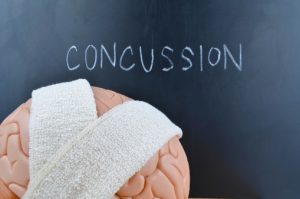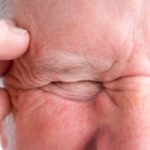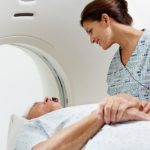 Concussion (traumatic brain injury) and head impact may accelerate brain aging. A concussion is a traumatic brain injury which alters the way the brain functions. Effects of concussion are usually temporary but continuous head trauma or lack of healing can have long-lasting effects.
Concussion (traumatic brain injury) and head impact may accelerate brain aging. A concussion is a traumatic brain injury which alters the way the brain functions. Effects of concussion are usually temporary but continuous head trauma or lack of healing can have long-lasting effects.
Aside from a direct blow to the head concussions can also be caused due to the head and upper body being aggressively shaken. Some symptoms of concussion include headache, concentration problems, memory problems, balance and coordination problems, and loss of consciousness.
Advertisement
If proper care is taken a person can fully recover from a concussion but it’s important to prevent future ones to avoid complications.
Concussions and even lesser head impacts may speed up the brain’s natural aging process
 Previous research has found that concussions and even milder head impacts can speed up the brain’s natural aging process. When a concussion or a head injury occurs it causes for signaling pathways in the brain to break down quicker compared to a person who has never experienced a concussion of head trauma.
Previous research has found that concussions and even milder head impacts can speed up the brain’s natural aging process. When a concussion or a head injury occurs it causes for signaling pathways in the brain to break down quicker compared to a person who has never experienced a concussion of head trauma.
Researchers from the University of Michigan School of Kinesiology and U-M Health system looked at college students without a history of concussions and uncovered changes to gait, balance and the brain’s electrical activity. The effects were seen up to six years after the head injury occurred even though the changes were subtle and both groups of students acted the same.
Steven Broglio, assistant professor of kinesiology and director of the Neurotrauma Research Laboratory, said, “The last thing we want is for people to panic. Just because you’ve had a concussion does not mean your brain will age more quickly or you’ll get Alzheimer’s. We are only proposing how being hit in the head may lead to these other conditions, but we don’t know how it all goes together just yet.”
Along with a concussion or head injury, Broglio outlined other risk factors which could speed up brain aging including smoking, exercise, diet, alcohol consumption, and family history.
Elderly recover slowly from concussion
 Although recovery from a concussion is possible the elderly recovery slowly compared to younger adults. A recent study used function MRI to look at the brains of seniors with concussion as it can reveal brain abnormalities. Lead author, David Yen-Ting Chen, said, “Old age has been recognized as an independent predictor of worse outcome from concussion, but most previous studies were performed on younger adults.”
Although recovery from a concussion is possible the elderly recovery slowly compared to younger adults. A recent study used function MRI to look at the brains of seniors with concussion as it can reveal brain abnormalities. Lead author, David Yen-Ting Chen, said, “Old age has been recognized as an independent predictor of worse outcome from concussion, but most previous studies were performed on younger adults.”
Thirteen young adults and 13 seniors were compared along with 26 control patients who never experienced a concussion. Scans were conducted 30 days after the injury and again after six weeks.
After the follow-up period young adults reduced post-concussion symptoms but no significant change was observed in the senior adults. Co-author Ying-Chi Tseng said, “Taken together, these findings provide evidence for differential neural plasticity across different ages, with potential prognostic and therapeutic implications. The results suggest that MTBI might cause a more profound and lasting effect in older patients.”
In the future better management skills must be utilized as a means to improve outcomes for seniors with concussions.
Treatment and management of concussion
Rest is the best form of treatment when it comes to a concussion. This will allow the brain to better recover and prevent further damage. You may be advised to abstain from physical activity and even activities which require you to focus or learn new concepts. This may involve working less hours or shortening your school days. As symptoms begin to improve you may gradually increase activity level as advised by your doctor.
To treat headaches, over the counter pain medications are safe to take as long as they contain acetaminophen and not ibuprofen which may lead to bleeding in the brain.
Tips to help prevent concussion
Concussions are preventable and so if you follow the below tips you can better prevent them and protect your brain from faster aging and other concussion-related complications. Tips to help prevent concussion include:
- Always wear a seat belt
- Never drive under the influence
- Wear a helmet for activities which require one – biking, many sports, snowboarding, etc.
- Reduce your risk of falls by wearing proper footwear, keeping your home tidy, paying attention when walking and not being distracted
- If you feel dizzy or lightheaded avoid using a ladder
- Have your vision checked as it can increase the risk of falls
Related Reading:
The elderly recover slower from concussions
New research reveals that the elderly take a longer time to recover from a concussion. Concussions are known as mild traumatic brain injuries and account for 75 percent of brain injuries that occur. Working memory may become affected after a concussion, but MRI and CT scans are unable to find abnormalities in the brains of concussion patients. Functional MRI (fMRI) is becoming more popular as a means of examining concussion patients. Continue reading…
Migraine headaches with auras may double the risk of stroke
Advertisement
Migraine headaches with auras may double the risk of stroke as found in much research. An aura refers to feeling and symptoms experienced prior to the onset of a migraine headache – this is also called prodrome. Although the exact cause of migraine headache auras are unknown, scientists believe that two common brain chemicals – serotonin and dopamine – may play a role. Continue reading…
Sources:
http://www.mayoclinic.org/diseases-conditions/concussion/basics/definition/con-20019272
http://ns.umich.edu/new/releases/20658-concussions-and-head-impacts-may-accelerate-brain-aging
//www.belmarrahealth.com/the-elderly-recover-slower-from-concussions/
http://www.mayoclinic.org/diseases-conditions/concussion/basics/treatment/con-20019272
http://www.hopkinsmedicine.org/healthlibrary/conditions/nervous_system_disorders/concussion_134,14/
